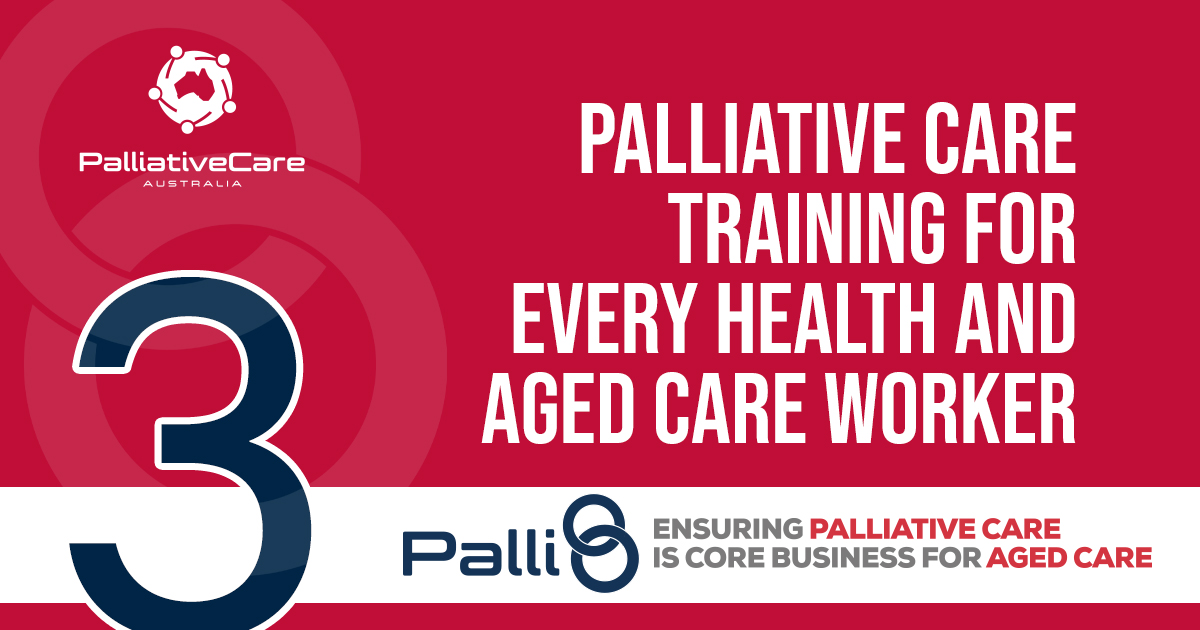Palliative care training for every health and aged care worker
Palliative care training for every health and aged care worker
Thursday, October 15, 2020
The PCA plan to improve palliative care in aged care recognises the importance of appropriate training for those working in aged care. It is important to note that:
- In 2017, there were 160,000 deaths in Australia, with 82% over 65 years and 35% occurring in residential aged care (57,769 people); and
- The number of people with complex care needs in residential aged care has grown rapidly from 10% in 2008-09 to 53 % in 2017-18 1.
It is therefore essential that staff working in aged care are suitably trained and equipped to meet these increasing palliative care needs and work with residents and consumers and families.
PCA believes that every health and aged care worker should undertake a minimum standard of palliative care training as part of their studies. Consequently, all undergraduate nursing, allied health, medical and certificate courses for care workers should include mandatory units on palliative care.
Royal Commission into Aged Care Quality and Safety
At the Commission’s Perth hearings on 27 June 2019, a panel of palliative care specialists gave evidence, including the then Chair of PCA, Dr Jane Fischer. The Commission’s Counsel Assisting’s Submission on Workforce noted that the panellists considered that:
- palliative care should be mandated as part of the training of the aged care workforce;
- the capacity to deliver palliative care by the aged care workforce is presently lacking; and
- palliative care should feature as part of the skill mix in aged care 2.
In order for staff within aged care to deliver effective palliative care, they must have minimum levels of core competencies to provide care for people with a life-limiting illness whose needs are relatively straightforward. This includes, at a minimum:
- understanding difference in illness trajectories;
- management of physical symptoms;
- recognising distress due to unmet palliative care needs;
- management of depression and anxiety;
- awareness of the importance of cultural and spiritual care needs;
- recognising deterioration and dying;
- an understanding of advance care planning and goals of care;
- delivering care appropriate to a care recipients care management plan;
- delivering consistent patient centred care;
- awareness of legal responsibilities;
- effective communication with people living with a life-limiting illness and their carers and families;
- an understanding of grief and bereavement; and
- self-care.
In addition, staff in aged care should be skilled to recognise when referral to other palliative care support including specialist palliative care is required.
Palliative Care Week
During Palliative Care Week 2020 (24-30 May), PCA commissioned a survey of 1,000 Australian adults across Australia regarding their views on palliative care. The survey found that:
- 85 per cent think it is extremely or very important that aged care services are able to provide palliative care to their clients;
- 56 per cent agree or somewhat agree that palliative care should be core business for aged care services; and
- 62 per cent think that palliative care training should be mandatory for aged care workers 3.
PCA has further detailed the need for appropriate palliative care training in aged care in a number of submissions to the Royal Commission:
- Counsel Assisting’s Submission on Workforce
- Issues Overview – palliative care within aged care
- First submission to the Royal Commission into Aged Care Quality and Safety
PCA also welcomed the release of the Reimagined Personal Care Worker Discussion Paper produced by Aged Care Services Industry Reference Committee that reimagine what a Personal Care Worker could and should be from the perspective of care recipients. PCA provided a submission on the paper:
[1] Productivity Commission 2017, Introducing Competition and Informed User Choice into Human Services: Reforms to Human Services, Report No. 85, Canberra. page 109.
[2] Royal Commission into Aged Care Quality and Safety 2020, Counsel Assisting's submissions on workforce, (paragraphs 105-107).
[3] Palliative Care Australia Community Survey 2020, May 2020
Media release: Palliative care must become core business in aged care
